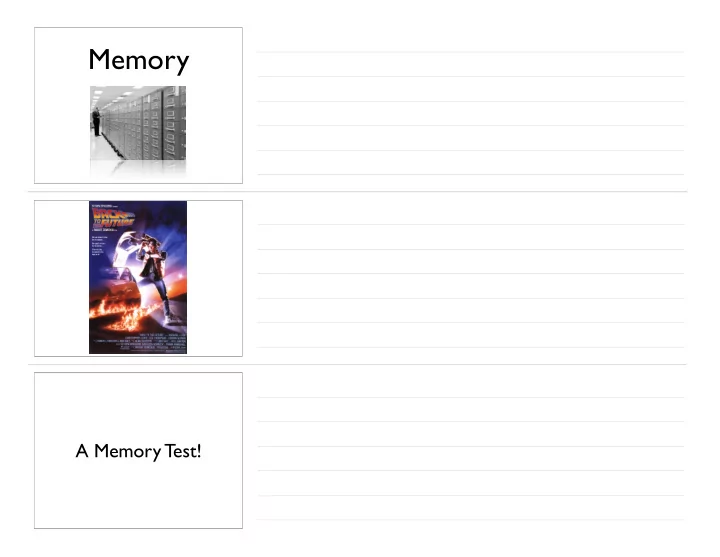

Memory A Memory Test!
Who remembers… cake sweet anger Who remembers… A cake sweet B anger C Who remembers… cake A sweet B anger C 0 10 20 30 40 50
Who remembers… A cake sweet B anger C 0 10 20 30 40 50 Remember These Words candy sour tart sugar honey chocolate cake tooth taste treat bitter good soda nice eat pie ?
Questions + Themes How are memory systems organized ? How much can we remember? Is memory reliable ? When and when not? What do we remember? Facts Experiences Skills Ideas Events Tasks Concepts First-Person Knowledge Habits Semantic Episodic Procedural Memory Memory Memory When do we remember? vs vs Sensory Short-Term Long-Term Memory Memory Memory
How do we remember? How do we remember? Encoding Storage Retrieval How do we remember? Encoding Storage Retrieval
How do we remember? Encoding Storage Retrieval Consolidation Memory Up next: Part 2/3 Memory Part 2/3
Distinctions that make a Difference ? vs Facts Skills Ideas Tasks Concepts Habits Semantic Procedural Memory Memory vs Storage Encoding
Dissociability Henry Molaison 1926-2008 Patient HM
Amnesia inability to remember Class Participation! reasoning language motor skills perception explicit/semantic memory
Anterograde Amnesia inability to form new memories Consolidation
Anterograde Amnesia inability to form new memories Retrograde Amnesia inability to retrieve old memories Anterograde Retrograde
vs Storage Encoding vs Facts Skills Ideas Tasks Concepts Habits Semantic Procedural Memory Memory
30 # of Errors 20 10 0 1 2 3 4 5 6 7 8 9 10 Attempt # HM improves over time! but doesn’t remember ever having completed the task (Squire, 2009) Capacity
candy sour tart sugar honey chocolate cake tooth Hard taste treat bitter good soda nice eat pie Easy When do we remember? vs vs Sensory Short-Term Long-Term Memory Memory Memory Sensory Memory Iconic Memory Echoic Memory
A Memory Test! X L W F J B O V K C Z R Most people: ~4 letters (Sperling, 1960)
X L W F J B O V K C Z R Most people: ~4 letters ! (Sperling, 1960) X L W F J B O V K C Z R
X L W F J B O V K C Z R vs vs Sensory Short-Term Long-Term Memory Memory Memory High Capacity (but decays quickly) A Memory Test!
6 9 1 8 7 4 5 4 5 7 4 2 2 9 6
3 5 6 7 1 8 4 8 5 4 7 2 0 8 2 7 4 2 6 4 Decays without rehearsal Position matters: Effects of Primacy and Recency Short-Term 7 ± 2 Memory
vs vs Sensory Short-Term Long-Term Memory Memory Memory High Low Capacity Capacity Memory Up next: Part 3/3 Memory Part 3/3
7 ± 2 Short-Term whats? Memory A Memory Test! 24 60 365 100
big pop cat run Chunking combining small pieces of information into larger, meaningful clusters 7 ± 2 Chunks ? A Memory Test!
⼼忄理痢学 In West Philadelphia born and raised, on the playground is where I spent most of my days Increase Capacity?
A Memory Test! Remember This Paragraph A newspaper is better than a magazine. A seashore is a better place than the street. At first it is better to run than to walk. You may have to try several times. It takes some skill but is easy to learn. Even young children can enjoy it. Once successful, complications are minimal. Birds seldom get too close. Rain, however, soaks in very fast. Too many people doing the same thing can also cause problems. One needs lots of room. If there are no complications it can be very peaceful. A rock will serve as an anchor. If things break loose from it, however, you will not get a second chance. This paragraph is about flying a kite
Remember This Paragraph A newspaper is better than a magazine. A seashore is a better place than the street. At first it is better to run than to walk. You may have to try several times. It takes some skill but is easy to learn. Even young children can enjoy it. Once successful, complications are minimal. Birds seldom get too close. Rain, however, soaks in very fast. Too many people doing the same thing can also cause problems. One needs lots of room. If there are no complications it can be very peaceful. A rock will serve as an anchor. If things break loose from it, however, you will not get a second chance. Increase Capacity?
STRANGER “Shallow” cloud 1. Uppercase? crate 2. Rhyme with “weight”? MARKET 3. Make sense with: FRIEND “He met a ____ in the street” ? GATE “Deep” … 100 Proportion recalled 75 50 25 0 Case Rhyme Sentence Increase Capacity?
“Method of Loci” or, the memory palace Simonides of Ceos (5th-6th Century BCE)
A Memory Test!
big naked bicycle cookie horse speech oatmeal spear dance baby yellow road lion big naked bicycle cookie horse speech oatmeal spear dance baby yellow road lion
vs vs Sensory Short-Term Long-Term Memory Memory Memory High Low Capacity Capacity ? Prof. Jonathan Flombaum Prof. Janice Chen
vs vs Sensory Short-Term Long-Term Memory Memory Memory High Low ??? Capacity Capacity ? 2,500 unique objects 3 seconds per object
Which have you seen? Success Rate: 93% ! Which have you seen?
Success Rate: 88% ! Which have you seen? Success Rate: 87% !
vs vs Sensory Short-Term Long-Term Memory Memory Memory High Low Massive Capacity Capacity Capacity! ? How to sort through it all? Context
Learn Dry Learn Wet 16 # of Words Recalled 12 8 4 0 Recall Dry Recall Wet (Godden & Baddeley, 1975) Hacking your memory to get an Ensure that learning context = recall context
Memory
Recommend
More recommend